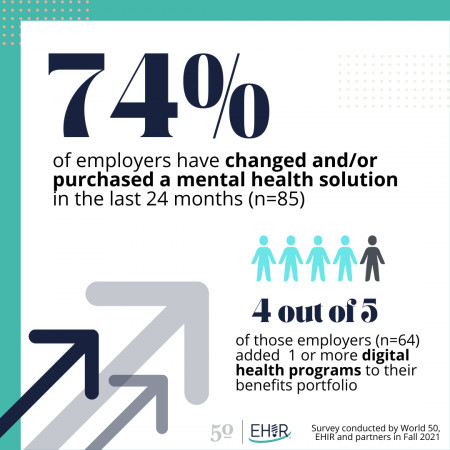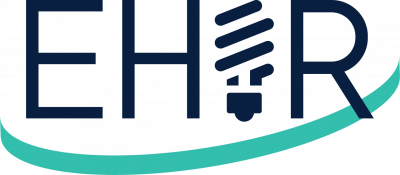Employer Survey Reveals Increased Investment in Digital Mental Health Solutions in Last 24 Months

MINNEAPOLIS, November 30, 2021 (Newswire.com) - World 50's Employer Health Innovation Roundtable (EHIR), a coalition of today's most progressive employers, today announced the results of a survey regarding company adoption of digital mental health solutions for employees. With more than 100 respondents comprising employee benefit leaders and operating executives from Fortune 100 and Fortune 1000 companies, the survey spotlights the growing trend toward — as well as the motivations, hesitations, and stressors behind — investment in solutions that replace and/or supplement traditional employee assistance programs (EAPs). Top findings reveal:
- Mental health is a growing priority for employers. The majority of respondents (74%) have changed and/or purchased a mental health solution in the last 24 months (n=85).
- Many employers are specifically investing in digital health solutions. Of the respondents who added to or changed their offering (n=63), four out of five (82%) added one or more digital health programs to their benefits portfolio.
- The digital mental health market is confusing to navigate. For those who have not made a change to their solutions portfolio (n=23), nearly half (40%) revealed they do not or are not sure they have a good understanding of the digital health landscape.
"It's exciting to see employers begin to navigate and invest in digital mental health solutions," states Michael Laquere, CEO of EHIR. "EHIR is dedicated to helping employers easily evaluate and choose a solution that's right for their organizations."
The survey was conducted in collaboration with partners from some of today's leading executive coalitions including World 50, Health Transformation Alliance (HTA), Midwest Business Group on Health (MGBH), Northeast Business Group on Health (NEBGH) and PeopleTech.
EMPLOYER SURVEY ON ADOPTING MENTAL HEALTH SOLUTIONS
There has been an explosion of digital mental health innovations over the past decade, with more than 20,000 mental health apps available today and roughly 100 new digital mental health startups joining the market every year. Despite all of the solutions in the market, only five percent of employees strongly agree that their employer provides a safe environment for those with mental health conditions, according to Mental Health America's new "Mind the Workplace" 2021 Report.
The following survey results highlight current employer experiences in navigating the solution landscape.
Selection and Purchasing Experiences: The majority of respondents (82%, n=85) consider themselves an early-stage adopter (i.e., one of first customers) or fast-follower (i.e., following first few customers and/or initial results). However, about one in four (26%) did not, in fact, add a new digital solution or make a change to their solution at all.
- Three-quarters of respondents (73%, n=60) evaluated one to five solutions before making a decision. Less than half reported using an RFP in the process.
- One in four (25%, n=62) said the pandemic had a 50% or higher impact on their purchasing decisions in this space over the past two years.
Motivations: Of those who changed or purchased their mental health solution (n= 63), the top five reasons spanned several important categories.
- The top-ranked reasons for changing included 1) access to mental health providers; 2) digital access to providers (e.g., telehealth); 3) specific population, condition or behavior addressed (e.g., adolescents, postpartum, sleep); 4) dissatisfaction with current mental health provider(s); and 5) integration with other programs or platforms (e.g., EAP, specific benefits).
Hesitations: Of those who have not made changes to their EAP or added a new digital mental health solution (n=22):
- The top five challenges in moving forward with changing or purchasing a new digital mental health solution were ranked as 1) cost/budget; 2) lack of integration with other programs or platforms (e.g., EAP, specific benefits); 3) other [business] priorities; 4) lack of proven or guaranteed outcomes; and tied for 5) pricing model/plan and lack of integration with medical plan (e.g., claims, provider network).
Personal Mental State: Respondents (n=64) also shared some insights on their own personal mental state indicating their concerns about the pandemic's impact on employees' anxiety and more, as well as increased stress over balancing operational needs and finding mental health solutions to address those impacts.
- In sharing about their own personal stress levels due to the pandemic:
- 75% of respondents indicated their stress had increased.
- Of the respondents reporting an increase in stress (n=48), one-third (31%) attributed the increase to personal matters at home.
- Two out of three (69%) attributed the increase to work-related issues including seeking solutions to keep their company operations running smoothly and seeking solutions to help address their employees' short- or long-term well-being.
- When asked "what keeps you up at night" in thinking about employees' mental health needs:
- The most frequently marked answer was "projected increase in anxiety due to the pandemic."
- Next-highest on the list included ensuring safety at work, modifications in conversion between in-office and work-at-home, projected increases in health costs, and the growing trend of women leaving the workforce.
"There are so many lessons learned and emerging best practices from employers who are assessing and adopting these solutions for their organizations," adds Laquere. "By shining a little light on those experiences, we hope to minimize the stress and confusion by helping employers match with the right solution to meet their people and business goals."
EHIR, World 50, and participating industry coalition partners are launching a free series of guided workbooks, workshops, and peer insights for all employers to navigate the digital health landscape, starting with mental health. To reserve a workbook and register for upcoming workshops, visit us.
SURVEY METHODOLOGY
The online survey was conducted between Oct. 1 and Oct. 31, 2021, amongst 102 executives responsible for purchasing health solutions. Respondents are members of EHIR and/or partnering communities such as World 50, HTA, MGBH, NEBGH, and PeopleTech. Half of respondents (50%) represent organizations with 20,000 employees or more. One out of four respondents (24%) belong to Fortune 1000 companies, 19% of respondents belong to the Fortune 500 and 11% belong to the Fortune 100.
ABOUT EHIR:
Employer Health Innovation Roundtable (EHIR), a World 50 company, consists of a private and independent network of the largest and most progressive employers. EHIR employer members collectively represent over 10 million employees and share a mission to accelerate the adoption of innovation for the sake of improving employee health, wellness and productivity. Members convene throughout the year to share learnings and collectively review and evaluate new solutions with an intimate group of like-minded peers through a streamlined process.
Media Inquiries:
Sam Yapp
EHIR, VP, Marketing, Events & Partnerships
925-519-0544
samantha@ehir.com
Source: Employer Health Innovation Roundtable (EHIR)
